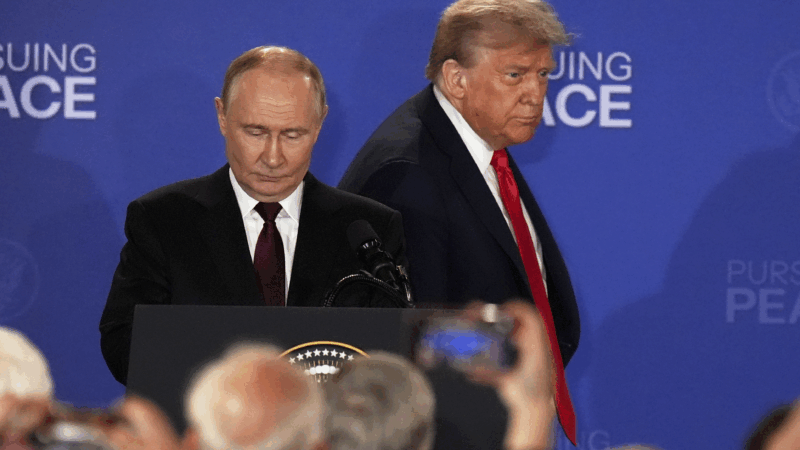Government papers found in an Alaskan hotel reveal new details of Trump-Putin summit
Papers with U.S. State Department markings, found Friday morning in the business center of an Alaskan hotel, revealed previously undisclosed and potentially sensitive details about the Aug. 15 meetings between President Donald Trump and Russian President Vladimir V. Putin in Anchorage.
Eight pages, that appear to have been produced by U.S. staff and left behind accidentally, shared precise locations and meeting times of the summit and phone numbers of U.S. government employees.
At around 9 a.m. on Friday, three guests at Hotel Captain Cook, a four-star hotel located 20 minutes from the Joint Base Elmendorf-Richardson in Anchorage where leaders from the U.S. and Russia convened, found the documents left behind in one of the hotel’s public printers. NPR reviewed photos of the documents taken by one of the guests, who NPR agreed not to identify because the guest said they feared retaliation.
The White House and the U.S. Department of State did not respond to requests for comment about the documents.

The first page in the printed packet disclosed the sequence of meetings for August 15, including the specific names of the rooms inside the base in Anchorage where they would take place. It also revealed that Trump intended to give Putin a ceremonial present.
“POTUS to President Putin,” the document states, “American Bald Eagle Desk Statue.”
Pages 2 through 5 listed the names and phone numbers of three U.S. staff members as well as the names of 13 U.S. and Russian state leaders. The list included phonetic pronouncers for all the Russian men expected at the summit, including “Mr. President POO-tihn.”
Pages 6 and 7 in the packet described how lunch at the summit would be served, and for whom. A menu included in the documents indicated that the luncheon was to be held “in honor of his excellency Vladimir Putin.”
A seating chart shows that Putin and Trump were supposed to sit across from each other during the luncheon. Trump would be flanked by six officials: Secretary of State Marco Rubio, Secretary of Defense Pete Hegseth and White House Chief of Staff Susie Wiles to his right, and Secretary of the Treasury Scott Bessent, Secretary of Commerce Howard Lutnick and Special Envoy for Peace Missions Steve Witkoff to his left. Putin would be seated immediately next to his Minister of Foreign Affairs, Sergey Lavrov, and his Aide to the President for Foreign Policy, Yuri Ushakov.
During the summit Friday, lunch was apparently cancelled. But it was intended to be a simple, three-course meal, the documents showed. After a green salad, the world leaders would dine on filet mignon and halibut olympia. Crème brûlée would be served for dessert.
Jon Michaels, a professor of law at UCLA who lectures about national security, said that the documents found in the printer of the Alaskan hotel reveal a lapse in professional judgement in preparation for a high-stakes meeting.
“It strikes me as further evidence of the sloppiness and the incompetence of the administration,” said Michaels. “You just don’t leave things in printers. It’s that simple.”
The printed papers are the latest example of a series of security breaches by officials of the Trump administration. Earlier this week, members of a law enforcement group chat that included members of U.S. Immigration and Customs Enforcement (ICE) added a random person to a conversation about an ongoing search for a convicted attempted murderer. In March, U.S. national security leaders accidentally included a journalist in a group chat about impending military strikes in Yemen.
If you have information to share, please reach out to the reporter who investigated this story, Chiara Eisner. You can reach her through encrypted platforms by contacting her on signal at username: ceis.78 or by email at [email protected].
House Dem. Leader Jeffries responds to air strikes on Iran by U.S. and Israel
NPR's Emily Kwong speaks to House Minority Leader Hakeem Jeffries (D-NY), who is still calling for a vote on a war powers resolution following a wave of U.S.- and Israel-led airstrikes on Iran.
Iran’s Ayatollah Ali Khamenei is killed in Israeli strike, ending 36-year iron rule
Khamenei, the Islamic Republic's second supreme leader, has been killed. He had held power since 1989, guiding Iran through difficult times — and overseeing the violent suppression of dissent.
Found: The 19th century silent film that first captured a robot attack
A newly rediscovered 1897 short by famed French filmmaker Georges Méliès is being hailed as the first-ever depiction of a robot in cinema.
‘One year of failure.’ The Lancet slams RFK Jr.’s first year as health chief
In a scathing review, the top US medical journal's editorial board warned that the "destruction that Kennedy has wrought in 1 in office might take generations to repair."
Here’s how world leaders are reacting to the US-Israel strikes on Iran
Several leaders voiced support for the operation – but most, including those who stopped short of condemning it, called for restraint moving forward.
How could the U.S. strikes in Iran affect the world’s oil supply?
Despite sanctions, Iran is one of the world's major oil producers, with much of its crude exported to China.




